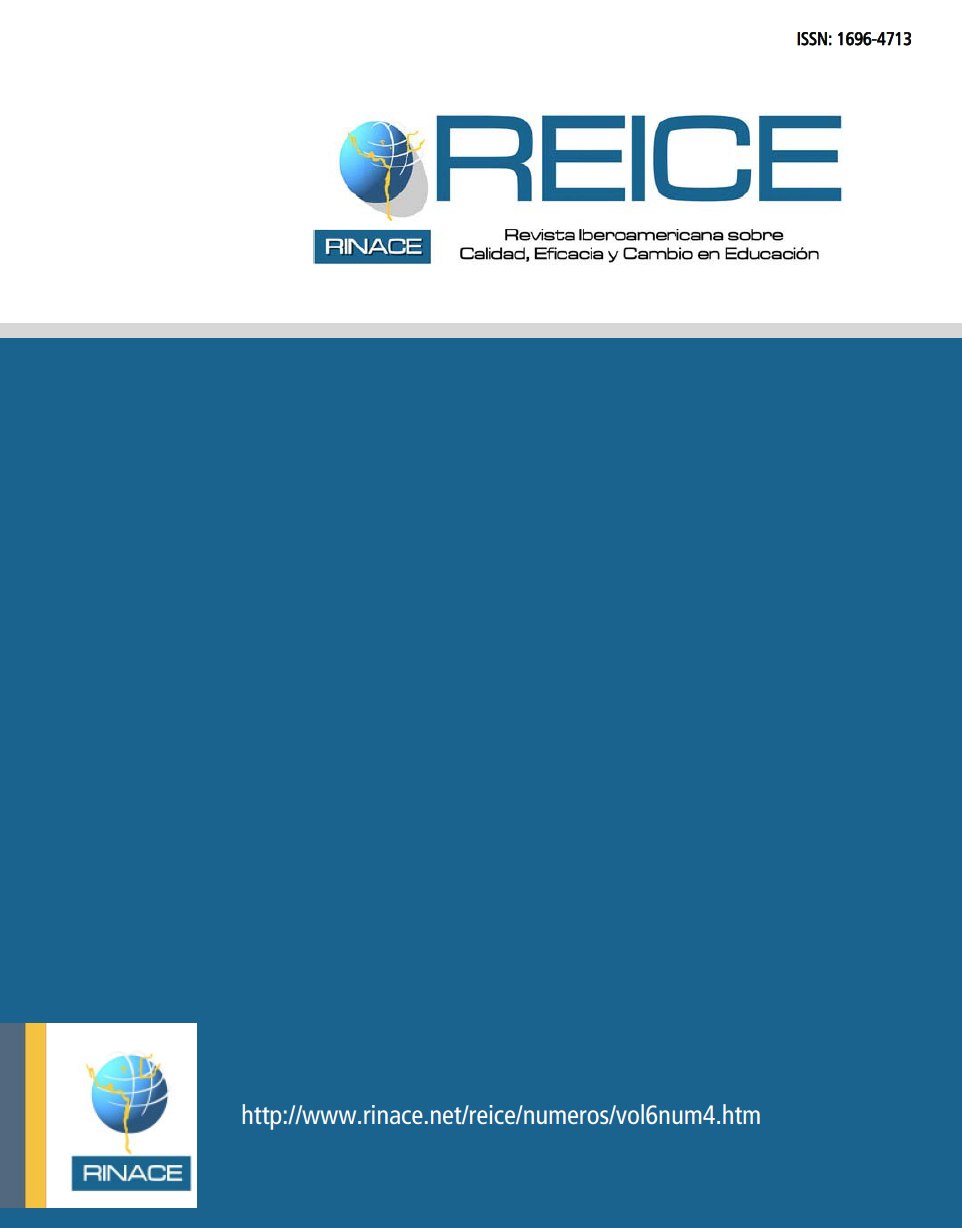Moving Towards an School Effectiveness Model. Multilevel Study Regarding Efffectiveness Factors at Spanish Schools
Keywords:
Quality, Effectiveness, Change, Improvement, Equity, Innovation.Copyright (c) 2016 REICE. Iberoamerican Journal on Quality Effectiveness and Educational Change

This work is licensed under a Creative Commons Attribution-NonCommercial-NoDerivatives 4.0 International License.
Abstract
This article presents an empirical research whose objective is to create a Schooling Effectiveness Model, as a necessary first step of a new school efficiency theory. A secondary analysis is developed, by means of Multilevel Modeling, regarding a nationwide evaluation sustained by Spanish elementary school students. Following a revision of the different models for school effectiveness developed up to date, an describing the study’s methodology, this article complies the results of the investigation, looking, at first, at the empirical model and global school effectiveness. Taking this as a starting point and in an effort to find a relationship between school and classroom factors, an analytical model for schooling effectiveness is proposed. Such a model can be used as a tool both for decision making and further investigations.
Downloads
References
Carroll, J.B. (1963). A model for school learning. Teachers College Record, 64(8), pp. 723-733.
Castejón, J.L. (1996). Determinantes del rendimiento académico de los estudiantes y de los centros educativos: modelos y factores. Alicante: Editorial Club Universitario.
Creemers, B.P.M. (1992). School effectiveness and effective instruction - The need for a further relationship. En J. Bashi y Z. Sass (Eds.), School Effectiveness and Improvement. Jerusalem: Hebrew University Press.
Creemers, B.P.M. (1994). The effective classroom. London: Cassell.
Cotton, K. (1995). Effective schooling practices: A research synthesis. 1995 updated. Portland, OR: Northwest Regional Educational Laboratory.
Cuttance, P. (1982). Reflections on the Rutter ethos: The professional researchers' response to Fifteen thousand hours: Secondary schools and their effects on children. Urban education, 16(4), pp. 483-492.
Edmonds, R. (1979). Effective schools for the urban poor. Educational Leadership, 37(1), pp. 15-24.
Fuentes, A. (1986). Procesos funcionales y eficacia de la escuela. Un modelo causal. Madrid: Universidad Complutense.
García Durán, M. (1991). Investigación evaluativa sobre las variables pedagógicas que discriminan entre los centros de EGB de alto y bajo rendimiento en el medio rural de la provincia de Cádiz. Tesis doctoral inédita, Facultad de Filosofía y CC. de la Educación. UNED.
INCE (1997). Evaluación de la educación primaria. Madrid: MEC/INCE.
Levine, D.U. y Lezotte, L.W. (1990). Unusually effective schools: a review and analysis of research and practice. Madison: National Center for Effective Schools Research and Development.
Muñoz-Repiso, M., Cerdán, J., Murillo, F.J., Calzón, J., Castro, M., Egido, I., García, R. y Lucio-Villegas, M. (1995). Calidad de la educación y eficacia de la escuela. Estudio sobre la gestión de los recursos educativos. Madrid: CIDE.
Muñoz-Repiso, M. y Murillo, F.J. (Coords.). (2003). Mejorar las escuelas, mejorar los resultados. Investigación europea sobre mejora de la eficacia escolar. Bilbao: Mensajero.
Murillo, F.J. (1996). ¿Son eficaces nuestras escuelas? Cuadernos de Pedagogía, 246, pp. 66-72.
Murillo, F.J. (2003). El movimiento de investigación de Eficacia Escolar. En F.J. Murillo (Coord.), La investigación sobre Eficacia Escolar en Iberoamérica. Revisión internacional del estado de la cuestión. Bogotá: Convenio Andrés Bello.
Murillo, F.J. (2005). Investigación sobre eficacia escolar. Barcelona: Octaedro.
Nuttall, D.L., Goldstein, H., Prosser, T. y Rabash, J. (1989). Differential School Effectiveness. International Journal of Educational Research, 7(13), pp. 769-776.
Postlethwaite, T.N. y Ross, K.N. (1992). Effective schools in reading. Implications for educational planners. The Hague: IEA.
Reynolds, D., Creemers, B., Stringfield, S., Teddlie, C y Schaffer, G. (2005). World Class Schools: International Perspectives on School Effectiveness. London: Routledge.
Rodríguez Gómez, G. (1991). Investigación evaluativa en torno a los factores de eficacia escolar de los centros públicos de EGB. Tesis doctoral inédita, Facultad de Filosofía y Ciencias de la Educación. UNED.
Sammons, P., Hillman, J. y Mortimore, P. (1995). Key characteristics of effective schools: A review of school effectiveness research. London: OFSTED.
Sammons, P., Nuttall, D.L. y Cuttance, P. (1993). Differential school effectiveness: Results from a reanalysis of the Inner London Education Authority's Junior School Project data. British Educational Research Journal(4), pp. 381-405.
Sammons, P., Thomas, S. y Mortimore, P. (1997). Forging links: Effective schools and effective departments. London: Paul Chapman Publishing.
Scheerens, J. (1990). School effectiveness research and the development of process indicators of school functioning. School Effectiveness and School Improvement, 1(1), pp. 61-80.
Scheerens, J. (1992). Effective schooling: research, theory and practice. London: Cassell.
Scheerens, J. y Bosker, R.J. (1997). The foundations of educational effectiveness. Oxford: Pergamon.
Scheerens, J. y Creemers, B.P.M. (1989). Towards a more comprehensive conceptualization of school effectiveness. En B.P.M. Creemers, T. Peters y D. Reynolds (Ed.), School effectiveness and school improvement (pp. 265-278). Lisse: Swets & Zeitlinger.
Slater, R. y Teddlie, C. (1992). Toward a theory of school effectiveness and leadership. School Effectiveness and School Improvement, 3(4), pp. 242-257.
Slavin, R.E. (1987). A theory of school and classroom organization. Educational Psychologist, 22(2), pp. 89-108.
Stoll, L. y Fink, D. (1996). Changing our schools. Linking school effectiveness and school improvement. Buckingham: Open University Press. Stringfield, S. y Slavin, R.E. (1992). A hierarquical longitudinal model for elementary school effects. En B.P.M. Creemers y G.J. Reezigt (Eds.), Evaluation of educational research (pp. 35-69). Groningen: ICO.
Teddlie, C. y Reynolds, D. (Eds.) (2000). The International Handbook of School Effectiveness Research. London: Falmer Press. Townsend, T. (Ed.) (2007). International Handbook of School Effectiveness and Improvement. New York: Springer.

